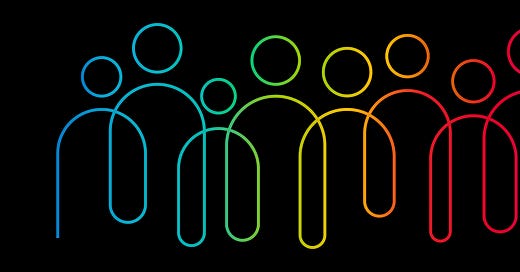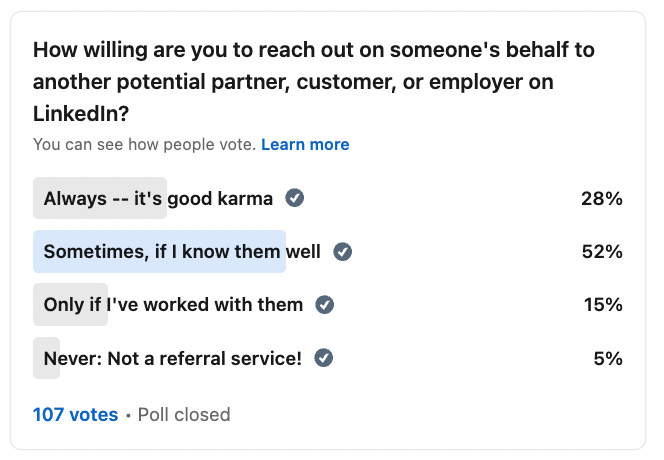I published a poll last week on LinkedIn as a litmus test on how my network networks.
I was inspired to do so by a request I had from a young woman I had worked with tangentially, who had been let go for reasons not related to performance. Through a mutual contact she was referred to me, and she had noticed I was connected to someone who may have been connected to the hiring manager for a role she was interested in pursuing.
I wanted to help this woman, but I was conflicted. There was no simple line to helping her: I knew her through a mutual contact and could not vouch for her qualifications, and the contact she wanted me to reach out to I don’t recall meeting — it’s probable we connected via LinkedIn because at one point we were in a similar industry, though that wasn’t the case now. And even still, the contact was not the hiring manager; it was unclear if my outreach would be appreciated, let alone responded to.
I told the young woman I could not help her with this request, but I felt badly about it, as I do many requests I’ve had to turn down, because I like being helpful. I like to think of myself as more a giver than a receiver when it comes to networking. But these days I’m not so sure.
After posting my unofficial poll of my network’s willingness to vouch for others in their network it appears the majority of respondents feel similarly to connection requests, with 52% citing that they will only fulfill requests for people the know well, and 15% saying they will only for people they’ve worked with and can vouch for. Somewhat surprising to me was the significant percentage (28%) who would connect contacts anytime, no questions asked.
My Optionality co-founder, Elisa Camahort Page commented:
I relate strongly to this. When I first joined LinkedIn, gosh, 20 years ago now, I used to only accept and extend invitations to people I had met. These are to me the highest-quality contacts one can have in a professional network. But as I started to explore new fields and ways of working I needed to open the aperture and bring in new people I thought could bring perspective and new visibility. As I started managing more people and global teams I realized I was woefully short of emerging, international talent in my network.
I accepted that as a Type 3 on the Enneagram and textbook Gemini, a major component of my daily routine would be spent on network tending. After 10 years of outreach to only people I had met face-to-face, I engaged in years of seed-planting, which included the sending and acceptance of connection invitations with people I had never met, never weeding out those that I could not recall accepting or ever engaging with. No contact gave me too much pause because the name of the game was to accept everyone as a potential opportunity generator and not over-analyze whether my weaker links were useful, or right. I was throwing good juju pennies into a jar that I might never need to tap into; just knowing I had it was enough.
I built a networking nest-egg that would sustain my career, wherever it went.
WEBINAR Wednesday May 22 at 12PM PT/3PM ET: Managing the Anxiety of an Optionality-Driven Life. The uncertainty of building an autonomous, bespoke worklife can trigger fears. This webinar will engage with two experts working at the intersection of mental health and work to give you practical advice and useful tactics for managing your anxiety, no matter what stage of the journey you're on.
But over the past few years I’ve noticed a general shift in inbound requests, from predominantly people I had just met and would like to know better, to people whose livelihoods are contingent on selling services to me. The network weeds started closing in, to a point where I couldn’t tend to them if I tried.
I had to be more discerning about my network; not just who I let in, but how I spent my time on it.
This was not a graceful transition. Not engaging with folks who wanted to sell me stuff I wasn’t interested in was easy; it was disengaging from the longer-standing layer of contacts whom I once valued but who now presented questionable opportunity, even harm, to my network that was difficult. For instance:
someone I had met from a previous advisory engagement who I admired for his brilliance and ability to capture a room. After recommending him to several close contacts and watching those relationships blow up after he reneged on terms and blamed my contacts for their incompetence, I had to stop returning his outreach;
a startup founder I admired who I agreed to formally advise, with stipulation that I support her go-to-market, not her fundraise, as I was already engaging investors for another project. Right after signing our agreement, she sent a list she pulled off of LinkedIn of 40+ investors in my network she would like me to reach out to for her imminent fundraise. I declined and haven’t heard from her since.
a new friend, and someone I wholeheartedly endorse for her expertise, but who another friend fittingly calls "a Taker". Even though I can help her, I question whether I should for fear she will rip the door I’ve cracked open for her right off the hinges, barge into my contact's living room and suck all the air out of it.
There are scores of situations like these that I’ve navigated over the years, and I simply endured them, for fear of breaking the unspoken networking “rules” that we learned in the beginning of our careers, but that don’t serve me now:
Never burn bridges. This rule presumes you have no personal or professional absolutes that can’t be negotiated for the right opportunity or price.
Always respond to outreach, even if you are declining. I finally calculated the time I wasted getting back to people I didn’t know to thoughtfully explain why I was not interested in hearing more about their project or product, and I realized how much more productive I could be focusing on the yeses.
Always reach out to a contact first before connecting them with someone. I still believe in this rule, though when the requested party does not respond, I’m put in the position of being a go-between, and I’m not able to take on multiple follow-ups.
When responding to people, always be respectful. I still follow this rule. But if you continue to hound me I respectfully reserve the right to make fun of your ridiculousness.
My new rules, designed to optimize my time and happiness:
If you are in my online network, but I don’t know you, I don’t need to respond to your follow up outreach requesting a call or meeting to pitch me. Heck, if I know you I may not respond, if it seems you are tapping every Tom, Dick, and Jory you know with an undifferentiated ask. I may even unfollow you, not because you are a bad person but because I’m a marketer, too, and I understand the name of the game is to spend more time with qualified leads. Trust me, I’m saving you time.
If you are a contact of mine, and you’ve asked me to reach out to someone in my network on your behalf, I will always be upfront about my level of willingness to do so. And I will not follow up with contacts who are unresponsive. You’ll likely have a better outcome from someone who is excited to reach out on your behalf than some half-ass attempt with no follow-up from me.
If I agree to connect you with someone and do it, please don’t ask for another connection anytime soon unless I suggest it. If you have multiple asks then pick the most important one, or the one you think I can be most effective at fulfilling. Obviously this does not apply to employers or companies I’ve formally committed to connecting to other companies.
If I do agree to connect you with someone but I don’t have direct experience working with you, I’ll share that with the other party. I appreciate write-ups that I can share with that other party detailing your ask and qualifications, but I reserve the right to edit that write up if it reads like an implied endorsement.
I won’t respond to connection requests that suggest meeting to "exchange valuable insights". I’m not Fractional Socrates, sitting in the Starbucks public square waiting to engage others on go-to-market theory. I suspect you’re not either. If I am interested in discussing your product or service, I’ll tell you.
Simply being in town is not reason enough to meet with you. Unless I know you well, or we have a clear business relationship or opportunity to discuss, sharing you are coming to my metro area does not motivate me to cancel meetings, arrange for someone else to pick up my kids from school, or commute inconveniently to meet you in person. This may be my most controversial rule, as meeting people just for the sake of meeting was once my mojo, but it’s not anymore. More often than not I’ll decline, or schedule a Zoom.
Having [Insert any number of] shared LinkedIn contacts is not a sufficient enough reason to connect with, let alone meet with, you. My identical twin sister and I shared a womb together, which bumps her up on the list of people whose calls I will always take, but having her as a shared connection does not prequalify you for that same distinction.
Just the act of writing down this list of rules I have largely been following the past few years feels like sharing a political statement—socially risky, and not without concern that some will take offense. But it also feels like an act of liberation for myself and even service to others who are grappling with the overgrowth of their unkempt networks.
What are YOUR rules of networking? Provide your insights in this week’s Open Thread, where we ask for your best networking practices.









I'm honored I'm n the unconditional call back list. Your rules makes perfect sense to me. That said, once or twice I have responded to one of those first encounters making solicitations, thinking 'Gosh they seem to know me and I'm embarrassed that I can't remember them." I've responded a little ashamed with myself, and then come to realize that I'm probably one of thousands who got that same overly familiar solicitation.